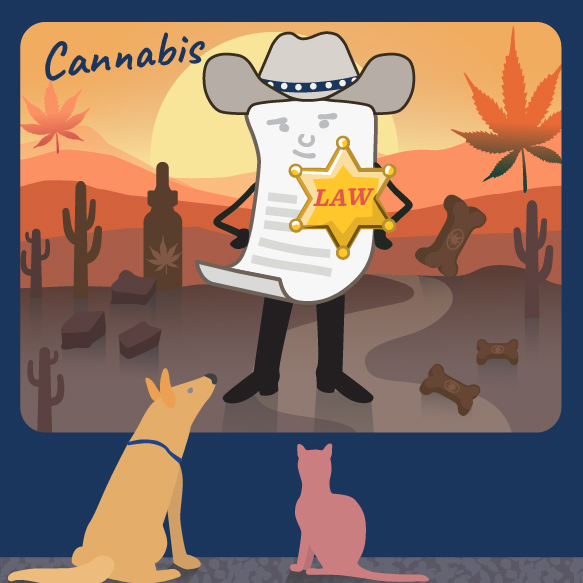Cannabis cartoon

 Listen to this story.
Listen to this story.
The growing legality and acceptance of cannabis among humans has long piqued pet owners' curiosity about how the drug might help cats and dogs suffering from pain, anxiety and other ills.
Veterinarians wanting to assist, though, often face unclear rules, which dissuades them from even talking about cannabis, prompting many clients to dose their animals without professional guidance.
Now, mounting shifts in the legal landscape may give practitioners more latitude to not only discuss the purported pros, cons and unknowns of cannabis use with clients but to recommend, prescribe and administer it, too.
In a significant development, the U.S. Department of Health and Human Services in late August recommended easing federal restrictions on cannabis. And four states — California, Michigan, Nevada and Utah — have implemented laws specific to its use in veterinary medicine.
California, for example, last year started allowing veterinarians to recommend cannabis therapeutically for animal patients, pleasing proponents such as Dr. Trina Hazzah.
"Owners were lost without guidance, and their pets were at risk," said Hazzah, a veterinary oncologist in Southern California and president of the advocacy group Veterinary Cannabis Society (VCS). "They had no one to turn to except budtenders and pet-shop owners, none of whom went to veterinary school."
But Dr. Lance Roasa, a veterinarian and lawyer based in Nebraska, cautioned that regardless of legislative and regulatory action at the state and federal levels, the true authority controlling legal access to cannabis as medicine is the U.S. Food and Drug Administration. "There is no legal way to use or recommend non-FDA-approved drugs because the extralabel drug rules require veterinarians to reach for the FDA-approved drug first," he said. "Since there are FDA-approved human drugs containing cannabis, veterinarians are expected to start there."
Roasa also is co-founder of a continuing education company, drip.vet, that is owned by the Veterinary Information Network, an online community for the profession and parent of the VIN News Service. He said he has worked with VCS to create continuing education for veterinarians on cannabis.
Potential therapeutic properties
When veterinarians refer to cannabis as a treatment, they're usually talking about cannabidiol (CBD), a non-intoxicating chemical produced by the plant. Some of veterinarians' uncertainty about cannabis owes to concern that another chemical the plant produces, tetrahydrocannabinol (THC) — which is responsible for getting people high — can be toxic for pets. As legalization of cannabis for people has spread nationwide, veterinarians have seen an increase in pet emergency room visits after dogs and cats have ingested the substance.
CBD's medicinal properties are wide-ranging, proponents maintain. Dr. Tim Shu, a former clinician who's now chief executive of cannabis business VetCBD, sums up the apparent benefits with the acronym PAINS — standing for pain, anxiety, inflammation, nausea/appetite loss and seizures. Most research, he said, is focused on pain, including three recent studies that found that dogs suffering from arthritis appeared to be in less pain and moved more easily after taking CBD.
Still, the scientific evidence pertaining to cannabis use in animals remains limited, according to the American Veterinary Medical Association. "While findings from a few well-controlled studies have been published, much of what we know is related to anecdotal or case reports or has been gleaned from studies related to use in humans ..." the association says in its guidance about the drug, adding that it supports further research.
The use of cannabis in human medicine is more extensive than in veterinary medicine. It is used by people to ease chronic pain, alleviate chemotherapy-related nausea and manage symptoms associated with a host of other conditions, such as epilepsy, multiple sclerosis, Alzheimer's disease, Parkinson's disease and HIV/AIDS.
Further complicating matters, CBD can be extracted from the federally legal hemp plant, which the federal government defines as cannabis containing less than 0.3% THC. (A pre-rolled joint sold in a dispensary typically contains 15% to 30% THC.)
In general, hemp-derived CBD products are sold online across the country. But these products are not subject to the same quality and safety requirements as recreational and medical cannabis produced within state markets. As a result, there's no easy way for consumers to know if they contain the amount of CBD advertised and/or unnamed and potentially toxic compounds.
"My comfort zone would be so much enhanced if I knew the product was a good product," said Dr. Dawn Boothe, a clinical pharmacology consultant at VIN, small animal internal medicine specialist and former professor at the Auburn University College of Veterinary Medicine.
Roasa, the veterinarian and lawyer, agreed. "It's truly a consumer-beware world, and it's up to the veterinarian to do their homework on any product they recommend," he said.
Federal rule change could enhance research opportunities
Marijuana, like heroin and LSD, is classified at the federal level as a Schedule I drug, meaning it has been deemed to have no accepted medical benefit and a high potential for abuse. Schedule II drugs have medical uses but high abuse potential, and include the likes of fentanyl and methadone.
Should marijuana be downgraded two notches to Schedule III, its perceived potential for abuse would fall to "moderate or low" for physical and psychological dependence.
The recommendation was based on a Department of Health and Human Services review done under a directive from President Biden, who wants to keep people caught with small quantities of the drug out of the criminal justice system. The proposal to reschedule cannabis is being reviewed by the Drug Enforcement Agency. The timeline for the agency's decision is unknown.
If enacted, the downgrade would more closely align the federal government with the 42 states and other jurisdictions that allow some form of medical use by people. (For recreational use, which is legal in 26 jurisdictions, a Schedule III drug would remain illegal federally but likely would be a lower enforcement priority.)
Two commonly used medications in veterinary practice — the anesthetic agent ketamine and euthanasia solutions containing pentobarbital — are classified as Schedule III drugs. Roasa points out that those drugs are approved by the FDA.
Canada law is silent on veterinary use
"The upcoming change would make research in certain settings more accessible," he said, "but the issue for veterinarians and veterinary researchers is not the Controlled Substances Act classification. It takes millions, if not tens of millions, of dollars to have a drug FDA-approved, and cannabis products are difficult to research because of the wide variation ... across strains and growing conditions."
Cannabis-related drugs approved by the FDA for human use are dronabinol (brand names Marinol and Syndros), which contains synthetic THC; nabilone (brand name Cesamet), which has a synthetic THC-like active ingredient; and Epidiolex, which contains CBD derived from plants. Roasa said the drugs tend to be "much more expensive than the non-approved drugs, which encourages pet owners to look to the unregulated market." (The WebMDRx website shows a 1,000-mg bottle of Epidiolex priced around $2,000.)
Roasa thinks of the pathway to legal use of cannabis in veterinary medicine as "a slow progression, punctuated by small steps." He maintained, "The proposed DEA rescheduling won't affect most clinical veterinarians right now."
Dr. Narda Robinson, founder and CEO of CuraCore VET, a school of integrated veterinary medicine in Fort Collins, Colorado, said she believes that, at the least, reclassifying cannabis likely would make it easier for research to be conducted into the benefits and risks associated with cannabis use, arming veterinarians with more knowledge.
Robinson added that a change at the federal level also might "soften the position of those state veterinary boards that still take an absolutist stance."
State law reform spreads slowly
More extensive change already has been occurring at the state level, albeit patchily.
Nevada in 2021 became the first state to authorize veterinarians to recommend and administer cannabis. Prior to that, California was the first state, in 2018, to explicitly protect veterinarians from disciplinary action if they discussed cannabis with clients. California lawmakers went further in 2022, voting unanimously to prohibit disciplinary action against licensed veterinarians for recommending cannabis (unless they are employed by or have an agreement with a cannabis business).
That law requires the state Department of Cannabis Control to develop standards for veterinary cannabis products by July 1, 2025. Until those standards are established, veterinarians in America's biggest state are not allowed to administer or sell cannabis products for pets — just recommend them.
Only two other states have adopted laws explicitly authorizing veterinarians to discuss veterinary use: Michigan in 2020 and Utah in 2022.
Dr. Susan Benson, president of the Utah Veterinary Medical Association, said the law there helps pet owners make reasonable decisions about care. "Not being able to talk about it made it a taboo subject," she said.
Clients were likewise afraid to raise it with their veterinarians, she said, whether they were curious about administering it as a therapeutic or their pet had unintentionally ingested a cannabis-containing product.
Benson said Utah will likely wait for more efficacy studies before it allows veterinarians to recommend cannabis.
Another state has taken a far more conservative stance. Rhode Island twice has failed to pass a medical cannabis bill for pets, in part due to concerns about toxicity expressed by the Rhode Island Veterinary Medical Association.
"Medical marijuana products are toxic and of no clinical use," the association states on its website. "Having pets get 'high' on these products is not only dangerous, but also considered animal cruelty."
Boothe, the pharmacologist, said most U.S. veterinary schools don't teach about cannabinoids (such as CBD), although she offered an extracurricular session while on the faculty at Auburn University. For practicing veterinarians, there's now "a lot of continuing education going on," she added.
Veterinarians on the vanguard of cannabis use insist that with proper monitoring, it has therapeutic value. Hazzah, the practitioner in Southern California, said she has incorporated it in her practice for years. "Much of the time," she said by email, "I rode the line between risking my license and fulfilling the duties of my veterinary oath."
Ross Kelly contributed to this report.